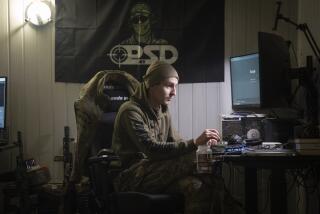Troops Send Word to Iraq: Look Out! : Military: Allied ground forces are spoiling to attack Baghdad’s armor, commanders say.
- Share via
WITH ALLIED FORCES IN THE PERSIAN GULF — You work on your enemy in different ways. And he works on you.
While much has been reported of Saddam Hussein’s efforts to terrorize Israel and Saudi Arabia with bunker bravado and Scud missiles, troops of the U.S. coalition have responded not just with a rain of bombs but with a psychological war campaign and some terrorism of their own--the frightening bay of a sprawling professional army, locked, loaded, limber and each day seeming to draw closer to the tripwire.
Field dispatches from reporters spread along the combat front, in ships and at airfields tell only anecdotal views of this complicated war. But there is no mistaking the aim of allied commanders in the reports filed Wednesday.
Cock your ear to the south, Hussein. The cough of artillery, the grinding of armor, the rumble of supply lines reaching hundreds of miles to the south, that is the sound of resolve, of readiness and of individual bravado to equal the enemy’s.
“The most military might I’ve ever seen is being laid on Iraq right now from the air,” said Col. Johnnie Hitt, 45, of Wells Point, Tex. He is commander of an Army aviation brigade lined up to attack Iraq’s front-line armor. “When the Army gets ready to go, it will be the same approach.”
At night on the front lines between Saudi Arabia and Iraq and occupied Kuwait, the horizon glows orange sometimes. A sunset of fire--the carpet bombing of B-52s, the low-lying fighter bombers scuttling over targets.
Military officials confirmed that these raids are being followed up by leaflets, fired by artillery pieces and dropped from aircraft, warning Iraq’s defensive troops they will be destroyed by long-range “pulverizing” weapons if they stay in place but will treated well by their Saudi brothers if they defect.
Some defections have been reported by Kuwaiti and U.S. authorities, and sentries at the front lines have been told to keep a lookout for Iraqi soldiers abandoning defensive positions in Kuwait. These soldiers are believed to be part of Hussein’s conscript regular army, where morale is considered suspect.
Gen. Colin L. Powell, chairman of the Joint Chiefs of Staff, said defections are “not a trend yet.” But there is plenty of military preparation for desertions if a ground battle is joined and U.S. forces break through Iraqi minefields and other barriers that may stand in the path of defectors. The Army says it has virtually completed huge, barbed-wire compounds to hold as many as 40,000 POWs on the front lines.
The allied plan calls for quickly shuttling battlefield POWs from these camps to rear areas in the south, out of the way of the U.S. advance. Army MPs said they will use returning supply trucks and a fleet of rented buses to move captured soldiers.
Meanwhile, while members of Congress voice concern over the toll of a premature ground war, battlefield commanders hope that the signals going to the war room in Baghdad are unequivocal: The allied army is restrained from heading north by nothing but a hair-trigger, which is unraveling strand by strand.
“We’ve got past the point where we sit around talking about how tough and Leatherneck-mean we are,” said Marine Cpl. Brian James, 21, of Gulf Breeze, Fla. “We have got to the point where we know the day is coming when we’ll have to prove it.”
This article was written from correspondent pool reports reviewed by a military censor.
More to Read
Sign up for Essential California
The most important California stories and recommendations in your inbox every morning.
You may occasionally receive promotional content from the Los Angeles Times.











